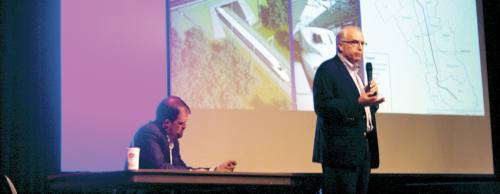Officials with Texas Central Partners—the company behind a proposed high-speed rail project connecting Houston to Dallas—believe growth in both cities make the project a necessity. However, a group of rural landowners from the Greater Houston area through Grimes County is fighting against the project, arguing that it is likely to fail and come back to haunt taxpayers.
The two groups clashed at a Sept. 28 public forum at Cypress Ranch High School hosted by State Rep. Mike Schofield, R-Katy. The proposed route, which the Federal Railroad Administration approved in August 2015, runs through the northern part of District 132, which Schofield represents.
Population increase brings need
TCP Vice President Jeff Moseley said 1,000 people are moving into the state every day, and Texas’ current population of 27 million is projected to hit 40 million in the next 30 years.
“Our roadways are congested today and will grow more congested,” he said. “We can ignore the growth …[or] we can be proactively involved and shape that growth.”
The rail system could carry 400 people at 200 miles per hour, with trains leaving every half hour, he said. A similar rail system has been in operation in Japan since 1964 with no deaths or accidents, Moseley said.
Texas Central would offer a convenient travel option to passengers between Dallas, Houston and the Brazos Valley and get a significant number of cars off the highway, Moseley said. Passengers could purchase tickets on their phones, have Wi-Fi service on the train and be able to access public transit, rental cars and parking at each station, he said.
With pricing comparable to rental cars, Moseley said rail would save passengers money, and it would create 10,000 jobs each year of construction in addition to 1,000 full-time positions to operate the completed system.
The $10 billion private investment in infrastructure, design and construction will generate a $36 billion economic impact for Texas over 25 years, Moseley said.
 Rural landowners against rail
Rural landowners against rail
Kyle Workman, president of Texans Against High Speed Rail, said he believes sufficient ridership to sustain the rail system is not attainable. He said he fears the project will come back to haunt taxpayers in the years to come.
Grimes County Judge Ben Leman spoke on the issue of eminent domain: the right of a governmental agent to take land from private owners for public use while providing compensation. He said major infrastructure projects like high-speed rail must go through a rigorous process to justify the use of eminent domain, and TCP has made many failed attempts to work around the process.
“Texas Central Partners as an entity has been doing everything they possibly can to circumvent that process that validates a project and justifies the use of eminent domain,” he said.
To obtain eminent domain, he said, an entity must go through a state agency or attain the rights directly from a law passed in legislation. Travis Kelly, TCP’s vice president of government relations, said the company has the authority to use eminent domain under the state Transportation Code.
Moseley said letters have gone out to landowners in Grimes County offering above market value for their land in hopes that enforcing eminent domain will not be necessary.
“We’re talking about protecting property rights,” Workman said. “We’re talking about ensuring that there’s no state funds ever—not just today, but that would ever be used. We’re talking about protecting the counties to make sure they’re not stuck with infrastructure improvements later.”
An environmental impact study for the project has been ongoing since fall 2014 and will continue until early 2017, according to TCP. At that time, final station locations will be announced to the public.
Construction could begin as early as 2018. No state money is expected to be used to fund the project.





